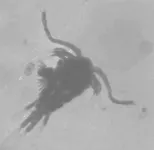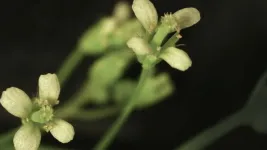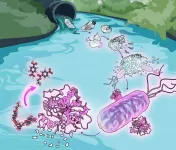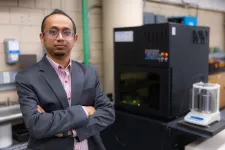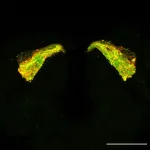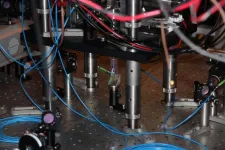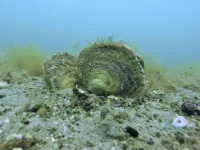(Press-News.org)
EL PASO, Texas (Oct. 3, 2024) – Scientists at The University of Texas at El Paso and Stanford University were recently surprised to find that the natural community of zooplankton — tiny, aquatic animals known to graze on bacteria — present in freshwater and saltwater do not clean water that is contaminated with fecal microorganisms.
The research, published today in the biology journal mSphere, reveals important insights about the limitations of zooplankton in treating bodies of water that have been contaminated with fecal organisms, the team said. A 2017 U.S. water quality inventory revealed that over 50% of rivers, bays and estuaries were unsafe for at least one use, in many cases because of fecal contamination.
“When sewage is released into clean bodies of water and humans are exposed to it, it can lead to illness in humans,” said Lauren Kennedy, Ph.D., assistant professor of civil engineering at UTEP, who is the corresponding author on the study. “Our research seeks to understand what factors can render pathogens unable to infect people. In other words, how long does it take for the water to become safe for recreation again without any forms of outside intervention?”
Kennedy explained that water from sewage and septic tanks can accidentally enter bodies of freshwater as a result of accidents, inadequate water treatment or corroded infrastructure.
The authors hypothesized that zooplankton naturally present in water might graze on microorganisms from fecal contamination, inactivating the organisms and effectively “cleaning” the water.
To test this idea, the team added a virus called MS2 and the bacteria E.coli to samples of freshwater and saltwater taken from the San Francisco Bay area of California. MS2 and E.coli are considered useful proxies for scientific research, Kennedy said, because they are present at high concentrations in sewage and their presence often indicates fecal contamination in the environment. The water samples naturally contained both “large” particles like zooplankton, sand and dirt, and “small” or dissolved particles like salt.
They found that the large particles, including zooplankton, did not have a significant effect on the inactivation of the pathogen proxies. The small particles, however, seemed to have a greater impact. The pathogen proxies were inactivated at higher rates in high-salinity water, for example, ocean water taken from San Pedro Beach.
“I am proud that we were able to provide another perspective to consider for surface water remediation efforts,” Kennedy said.
The research, she added, is an important step forward in understanding the limits of zooplankton as natural “cleaners” of contaminated water. The next phases of the research will focus on the impact of salinity on pathogen survival in contaminated waters.
“I am proud to see this important work coming from our team,” said Carlos Ferregut, Ph.D., chair of the Department of Civil Engineering. “The research by Dr. Kennedy and her team provides valuable insights into the challenges of pathogen inactivation, especially in areas where wastewater can compromise human health.”
About The University of Texas at El Paso
The University of Texas at El Paso is America’s leading Hispanic-serving university. Located at the westernmost tip of Texas, where three states and two countries converge along the Rio Grande, 84% of our 24,000 students are Hispanic, and more than half are the first in their families to go to college. UTEP offers 170 bachelor’s, master’s and doctoral degree programs at the only open-access, top-tier research university in America.
END
The rising demand for tech jobs presents an outstanding opportunity for growth and inclusivity in the industry. Developing accessible training programs tailored for individuals with disabilities can foster a more diverse workforce. Florida Atlantic University’s College of Education and the College of Engineering and Computer Science have received a $9,961,460 grant from the United States Department of Education’s Office of Special Education and Rehabilitative Services to increase the capacity and participation of transition-age youths and working-age adults with disabilities in high demand technology jobs locally and nationally. ...
Tending a garden is hard work. Imagine it from the plants’ perspective. Each relies on fine-tuned genetic processes to pass down accurate copies of chromosomes to future generations. These processes sometimes involve billions of moving parts. Even the tiniest disruption can have a cascading effect. So, for plants like Arabidopsis thaliana, it’s good to have a backup plan.
“Chromosomes have to be accurately partitioned every time a cell divides,” explains Cold Spring Harbor Laboratory (CSHL) Professor and HHMI Investigator Rob Martienssen. “For that to happen, each chromosome has ...
Increasingly complex applications such as artificial intelligence require ever more powerful and power-hungry computers to run. Optical computing is a proposed solution to increase speed and power efficiency but has yet to be realized due to constraints and drawbacks. A new design architecture, called diffraction casting, seeks to address these shortcomings. It introduces some concepts to the field of optical computing that might make it more appealing for implementation in next-generation computing devices.
Whether ...
Researchers have long observed that a common family of environmental bacteria, Comamonadacae, grow on plastics littered throughout urban rivers and wastewater systems. But what, exactly, these Comamonas bacteria are doing has remained a mystery.
Now, Northwestern University-led researchers have discovered how cells of a Comamonas bacterium are breaking down plastic for food. First, they chew the plastic into small pieces, called nanoplastics. Then, they secrete a specialized enzyme that breaks down the plastic even further. Finally, the bacteria use a ring of carbon atoms from the plastic as a ...
10-2-24
Contacts:
Sougata Roy, Mechanical Engineering, 515-294-5001, sroy@iastate.edu
Mike Krapfl, News Service, 515-294-4917, mkrapfl@iastate.edu
Researchers study 3D printing tungsten parts for extreme conditions in nuclear reactors
AMES, Iowa – Sougata Roy, who doesn’t study electrons or grids or wind turbines, has found a way to contribute to a clean-energy future.
“This work in advanced manufacturing, particularly in using additive manufacturing, is about making a difference,” ...
EMBARGOED: NOT FOR RELEASE UNTIL THURSDAY 3 OCTOBER AT 07:00 ET (12:00 UK TIME)
An international team of researchers have made a promising breakthrough in the development of drugs to treat Alzheimer’s Disease.
For the first time, scientists have developed a drug that works on both major aggregation-promoting ‘hotspots’ of the Tau protein - addressing a critical gap in current treatments.
The drug, a peptide inhibitor called RI-AG03, was effective at preventing the build-up of Tau proteins - a key driver of neurodegeneration - in both lab and fruit fly studies.
The ...
University of Copenhagen mathematicians have developed a recipe for upgrading quantum computers to simulate complex quantum systems, such as molecules. Their discovery brings us closer to being able to predict how new drugs will behave within our bodies and has the potential to revolutionize pharmaceutical development.
Developing a new drug can take more than a decade and cost anywhere from hundreds of millions to billions of euro — with multiple failed attempts along the way. But what if we could predict how a drug worked ...
A new publication in Nature Reviews Methods Primers provides essential guidance for conducting rigorous systematic reviews on studies with animals and cells. It also highlights the benefits of these reviews, such as improving reproducibility and reducing animal use, and addresses potential pitfalls and recent advancements like review automation.
Systematic reviews synthesize existing evidence in a scientific field to answer specific research questions in a structured and unbiased way. With over 100 million animals used in scientific ...
Oysters once formed extensive reefs along much of Europe's coastline – but these complex ecosystems were destroyed over a century ago, new research shows.
Based on documents from the 18th and 19th Centuries, the study reveals that European flat oysters formed large reefs of both living and dead shells, providing a habitat supporting rich biodiversity.
Today these oysters are mostly found as scattered individuals – but the researchers found evidence of reefs almost everywhere, from Norway to the Mediterranean, covering at least 1.7 million hectares, an area larger than Northern Ireland.
The research was ...
Utilizing one of the longest-running ecosystem experiments in the Arctic, a Colorado State University-led team of researchers have developed a better understanding of the interplay among plants, microbes and soil nutrients — findings that offer new insight into how critical carbon deposits may be released from thawing Arctic permafrost.
Estimates suggest that Arctic soils contain nearly twice the amount of carbon that is currently in the atmosphere. As climate change has caused portions of Earth’s northernmost polar regions to thaw, scientists have long been concerned about significant amounts of carbon being released in the ...
